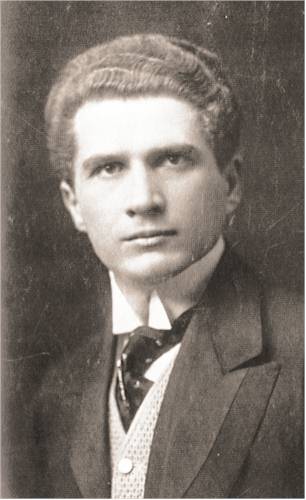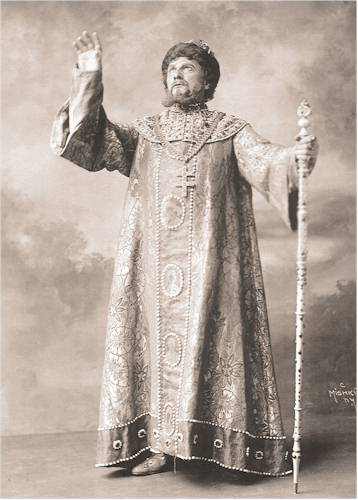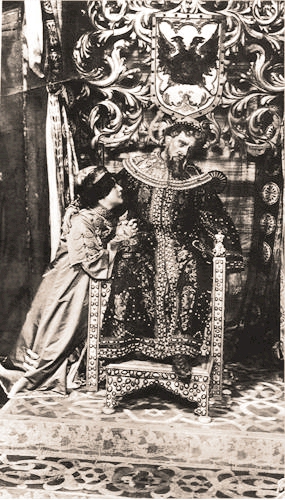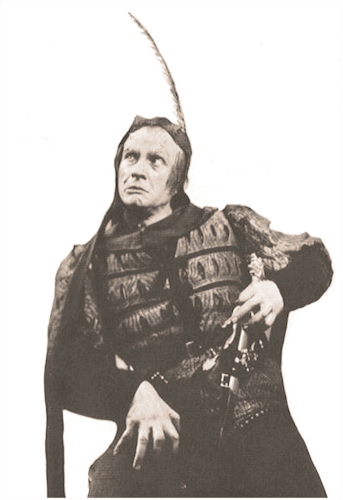Polish bass, 1874 - 1946
BORN: Adamo [Adam] Didur, 24 December 1874, Wola Sekowa, nr Sanok (Galicia) DIED: 7 January 1946, Katowice. FAMILY:
Married to the Mexican singer Angela Aranda Arellano (1874-1928) with whom STUDIED:
Didur studied with two of the most well-known teachers,
Didur as Boris - beautifully portrayed by NADAR
DEBUT:
As Méphistophélès in Gounod’s Faust, Rio de Janeiro (1894). Met debut as Ramfis in Verdi’s Aida in an all-star cast with Emmy Destinn, Louise Homer, Enrico Caruso and Antonio Scotti.
From 1899, the Warsaw Opera House became one of the greatest stages for Italian Opera in Europe. The most illustrous stars of Italian belcanto-tradition regularly appeared at Warsaw. As
a result of the excellent cultural relations between Poland and Italy, Giulio Gatti-Casazza, then impresario of the Scala di Milano, strongly influenced Didur’s career. Another influential mentor was ROLES: Méphistophélès Faust (Gounod); Boris Boris Godunov (Mussorgsky); Marcel Les Huguenots (Meyerbeer); Ramfis
Aida (Verdi); Colline La Bohème (Puccini); Mefistofele Mefistofele (Boito); Coppélius Les Contes d’Hoffmann (Offenbach; Sparafucile Rigoletto (Verdi); Galitzky Prince Igor
(Borodin); Leporello Don Giovanni (Mozart); Archibaldo L’Amore dei tre re (Montemezzi); Philip II Don Carlo (Verdi); Basilio Il Barbiere di Siviglia (Rossini); Figaro Le
Nozze di Figaro (Mozart);TomskyThe Queen of Spades (Tchaikovsky); Kezal The Bartered Bride (Dvorak); Tonio I Pagliacci (Leoncavallo); Klingsor Parsifal (Wagner); Oberthal Le Prophète
(Meyerbeer); Don Alfonso Così fan tutte (Mozart); Mustafà L’Italiana in Algeri (Rossini); Alvise Badoero La Gioconda (Ponchielli); Scarpia Tosca (Puccini); Billy Jackrabbit
La Fanciulla del West (Puccini); Talpa Il Tabarro (Puccini); Simone Gianni Schicchi (Puccini); Woodcutter Königskinder (Humperdinck); Il Cieco Iris (Mascagni); Franz Lodoletta
(Mascagni); Gremin Eugene Onegin (Tchaikovsky); Pistol Falstaff (Verdi); Giovanni Filippo Palm Germania (Franchetti); Hu-Tsin L’Oracolo (Leoni). COMPANIES & VENUES:
Warsaw Opera (1899-1903); La Scala (1903-1906); Russia (1909); Covent Garden (1905/1914). Manhattan Opera House (1907); Met (1908-1933) Met World premieres:
La Fanciulla del West (1910); Königskinder (1910); Il Tabarro (1918); Gianni Schicchi (1918) Met American premieres: Germania (1908); Iris (1908); Queen of Spades (1910); Le Donne
curiose (1912); L’Amore dei tre re (1914); Prince Igor (1915); Lodoletta (1918); Le Coq d’or (1918); Eugene Onegin (1920); La Cena delle beffe (1926). Guest performances:
Teatro Real Madrid, Teatro Liceo Barcelona; Operas of Moscow, St. Petersburg, Kiew, Odessa; Operas of Rome, Bologna, Palermo, Genua; Guest performances in South America, etc. NOTEWORTHY:
Boris was probably Didur’s finest role which he performed in the 1913 American premiere to score his first great New York success. He inhabited the role alone during
the first eight years of the opera’s life in the United States. In the 1922 season After retiring in 1933 he returned to Poland and became Director of the Cracow Opera and later
as Professor at Lvov (as Lemberg had become) and Katowice. After the war he was involved in organizing the opera at Bytom (Silesia).
Anna Case (Fyodor) and Adamo Didur (Boris) in the beautiful Diaghilev production, Met 1913
(the Italian version was conducted by Arturo Toscanini)
In the title role of Boito’s Mefistofele COMMENT: Didur has ranked as one of the most oustanding basses of the 20th century. His voice had a black
timbre, a wonderful richness of tone, an astonishingly agilty (quite rare in a bass voice) and, last but not least, an extraordinary vocal range which enabled him to sing both bass- and baritone
roles. In addition to this vocal gifts Didur was a passionate and expressive actor on stage. We should not forget, however, that by the 1920s his voice showed signs of wear-and-tear and he
was even forced to take on minor roles. His huge voice recorded very well. His singing in declamatory music, here in Marcel’s macabre ‘Huguenot Song’, is simply breathtaking.
|
||||||||||||||||||||||




